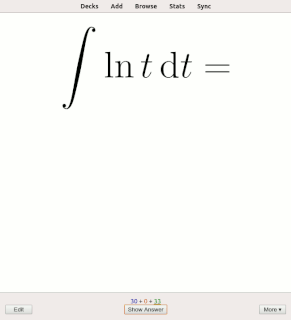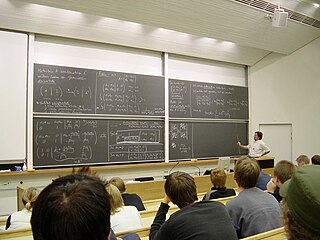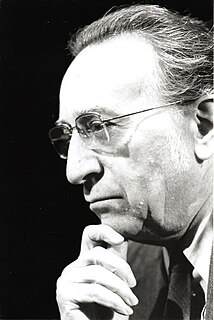Related Research Articles

Education is the process of facilitating learning, or the acquisition of knowledge, skills, values, beliefs, and habits. Educational methods include teaching, training, storytelling, discussion and directed research. Education frequently takes place under the guidance of educators, however learners can also educate themselves. Education can take place in formal or informal settings and any experience that has a formative effect on the way one thinks, feels, or acts may be considered educational. The methodology of teaching is called pedagogy.
Educational psychology is the branch of psychology concerned with the scientific study of human learning. The study of learning processes, from both cognitive and behavioral perspectives, allows researchers to understand individual differences in intelligence, cognitive development, affect, motivation, self-regulation, and self-concept, as well as their role in learning. The field of educational psychology relies heavily on quantitative methods, including testing and measurement, to enhance educational activities related to instructional design, classroom management, and assessment, which serve to facilitate learning processes in various educational settings across the lifespan.

Learning theory describes how students receive, process, and retain knowledge during learning. Cognitive, emotional, and environmental influences, as well as prior experience, all play a part in how understanding, or a world view, is acquired or changed and knowledge and skills retained.
The philosophy of education examines the goals, forms, methods, and meaning of education. The term is used to describe both fundamental philosophical analysis of these themes and the description or analysis of particular pedagogical approaches. Considerations of how the profession relates to broader philosophical or sociocultural contexts may be included. The philosophy of education thus overlaps with the field of education and applied philosophy.
A teaching method comprises the principles and methods used by teachers to enable student learning. These strategies are determined partly on subject matter to be taught and partly by the nature of the learner. For a particular teaching method to be appropriate and efficient it has to be in relation with the characteristic of the learner and the type of learning it is supposed to bring about. Suggestions are there to design and selection of teaching methods must take into account not only the nature of the subject matter but also how students learn. In today's school the trend is that it encourages much creativity. It is a known fact that human advancement comes through reasoning. This reasoning and original thought enhances creativity.
Constructivism may refer to:
Professional development is learning to earn or maintain professional credentials such as academic degrees to formal coursework, attending conferences, and informal learning opportunities situated in practice. It has been described as intensive and collaborative, ideally incorporating an evaluative stage. There is a variety of approaches to professional development, including consultation, coaching, communities of practice, lesson study, mentoring, reflective supervision and technical assistance.
Science education is the teaching and learning of science to non-scientists, such as school children, college students, or adults within the general public. The field of science education includes work in science content, science process, some social science, and some teaching pedagogy. The standards for science education provide expectations for the development of understanding for students through the entire course of their K-12 education and beyond. The traditional subjects included in the standards are physical, life, earth, space, and human sciences.
Social constructivism is a sociological theory of knowledge according to which human development is socially situated and knowledge is constructed through interaction with others.

Rote learning is a memorization technique based on repetition. The idea is that one will be able to quickly recall the meaning of the material the more one repeats it. Some of the alternatives to rote learning include meaningful learning, associative learning, and active learning.
Learning theory may refer to:
Bloom's taxonomy is a set of three hierarchical models used to classify educational learning objectives into levels of complexity and specificity. The three lists cover the learning objectives in cognitive, affective and sensory domains. The cognitive domain list has been the primary focus of most traditional education and is frequently used to structure curriculum learning objectives, assessments and activities.

In contemporary education, mathematics education is the practice of teaching and learning mathematics, along with the associated scholarly research.

Student-centered learning, also known as learner-centered education, broadly encompasses methods of teaching that shift the focus of instruction from the teacher to the student. In original usage, student-centered learning aims to develop learner autonomy and independence by putting responsibility for the learning path in the hands of students by imparting to them skills, and the basis on how to learn a specific subject and schemata required to measure up to the specific performance requirement. Student-centered instruction focuses on skills and practices that enable lifelong learning and independent problem-solving. Student-centered learning theory and practice are based on the constructivist learning theory that emphasizes the learner's critical role in constructing meaning from new information and prior experience.

Pedagogy, most commonly understood as the approach to teaching, is the theory and practice of learning, and how this process influences, and is influenced by, the social, political and psychological development of learners. Pedagogy, taken as an academic discipline, is the study of how knowledge and skills are imparted in an educational context, and it considers the interactions that take place during learning. Both the theory and practice of pedagogy vary greatly, as they reflect different social, political, and cultural contexts.
Experiential education is a philosophy of education that describes the process that occurs between a teacher and student that infuses direct experience with the learning environment and content. The term is not interchangeable with experiential learning; however experiential learning is a sub-field and operates under the methodologies of experiential education. The Association for Experiential Education regards experiential education as "a philosophy that informs many methodologies in which educators purposefully engage with learners in direct experience and focused reflection in order to increase knowledge, develop skills, clarify values, and develop people's capacity to contribute to their communities". Experiential education is the term for the philosophy and educational progressivism is the movement which it informed.

Constructivism is a theory in education that recognizes the learners' understanding and knowledge based on their own experiences prior to entering school. It is associated with various philosophical positions, particularly in epistemology as well as ontology, politics, and ethics. The origin of the theory is also linked to Jean Piaget's theory of cognitive development.

Caleb Gattegno (1911–1988) was one of the most influential and prolific mathematics educators of the twentieth century. He is best known for his innovative approaches to teaching and learning mathematics, foreign languages and reading. He is also the inventor of pedagogical materials for each of these approaches, and the author of more than 120 books and hundreds of articles largely on the topics of education and human development.

Teacher education TE (TE) or teacher training refers to the policies, procedures, and provision designed to equip (prospective) teachers with the knowledge, attitudes, behaviors, and skills they require to perform their tasks effectively in the classroom, school, and wider community. The professionals who engage in training the prospective teachers are called teacher educators.

The "classical education movement" is a form of education that emphasizes history, literature and language studies within a modern school framework. The term "classical education" has been used in Western culture for several centuries, with each era modifying the definition and adding its own selection of topics. By the end of the 18th century, in addition to the trivium and quadrivium of the Middle Ages, the definition of a classical education embraced study of literature, poetry, drama, philosophy, history, art, and languages.